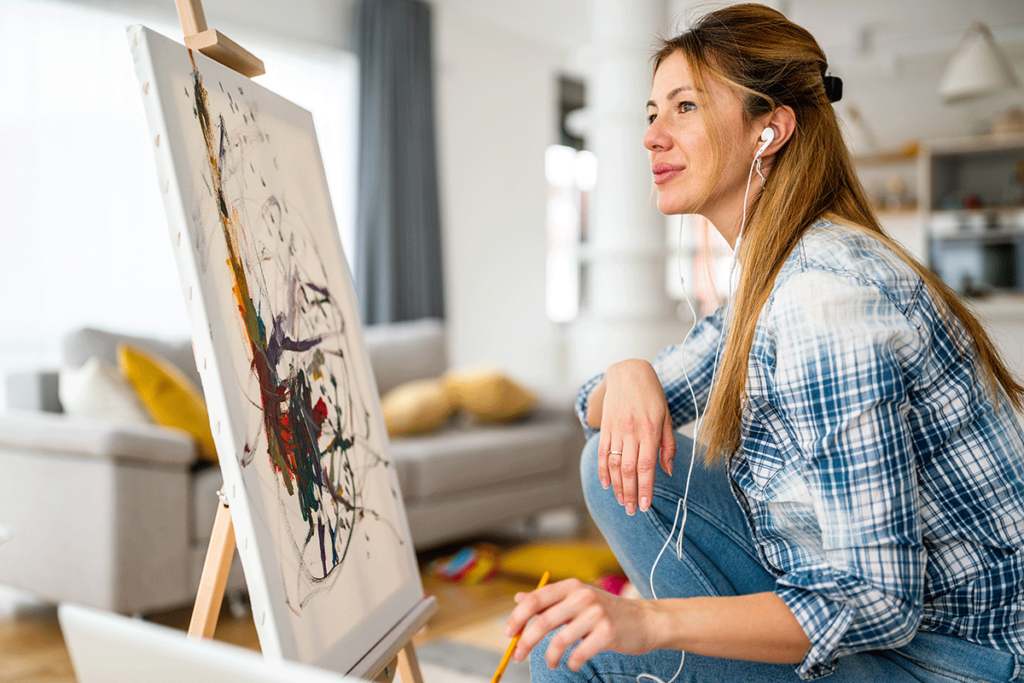Art therapy has been used in a variety of behavioral health settings, including addiction treatment. Art therapy for addicts can provide an outlet to help them explore their emotions and experiences while in recovery. It gives addicts the opportunity to express themselves in a safe, supportive environment without judgment or criticism from others.
The Arbor Behavioral Healthcare offers evidence-based therapies and holistic approaches, including art therapy, in the treatment of substance use disorder and accompanying mental health conditions. Call 844.413.2690 today to learn more or get started with The Arbor experience.
What Is Art Therapy?
Art therapy is an expressive form of psychotherapy that uses art as a tool to explore thoughts, emotions, and behaviors. The focus of art therapy is on the creative process itself rather than on the products created. Creating artwork can help individuals relax and express themselves through visual expression. Art therapy activities are often used to explore feelings, coping strategies, and self-esteem.
Benefits of Art Therapy for Addicts
Art therapy can help addicts identify unconscious feelings and develop insight into their condition. It also allows individuals to gain clarity on healthy coping strategies and explore different ways of expressing emotion without using drugs or alcohol. Additionally, art therapy effectively builds self-worth, increases problem-solving skills, and develops healthier relationships.
Art therapy also helps to:
- Reduce stress and anxiety
- Improve self-esteem
- Increase insight into personal issues
- Promote a sense of accomplishment
The goal of art therapy for addicts is to use art as a tool to help them gain insight into themselves while exploring healthy coping strategies that they can use in times of need.
What Form Can Art Therapy Take?
Art therapy is a broad term for various creative therapeutic approaches. Generally, art therapy in a behavioral health context involves exploring feelings and emotions through creating artwork. This can involve a variety of mediums, such as drawing, painting, sculpting, or collage-making. It can also include activities like writing music or poetry.
Drawing
Drawing is useful as a form of art therapy because it is a simple, accessible activity that can be used to explore the complexity of feelings.
Painting
Painting allows for the exploration of various colors, textures, and patterns to express emotions.
Sculpting
Sculpting can help individuals work through feelings by creating physical representations of their emotions.
Collage-Making
College-making is an excellent way to explore different aspects of the self. Combining objects and images creates a unique visual representation of the individual’s experience.
Music/Poetry
Writing music or poetry can be helpful for expressing emotions when language fails. It can provide a soothing effect and help to explore both conscious and unconscious thoughts and feelings.
Whatever the medium, art therapy offers positive outcomes for the treatment of substance use disorders and helps maintain recovery.
Contact The Arbor Behavioral Healthcare for Art Therapy
The Arbor Behavioral Healthcare is committed to providing comprehensive, evidence-based therapies and holistic approaches to addiction treatment. We offer art therapy as part of our individualized treatment plans.
In addition to art therapy, we have a variety of amenities and services, including the following:
- Personal chefs
- Personal trainer
- Yoga
- Basket/volleyball
- River for fishing and swimming
- Lots of outdoor activities (including equine therapy)
- Disc golf
If you or someone you love is struggling with addiction, reach out to The Arbor Behavioral Healthcare for help. Our experienced and compassionate team of professionals provides evidence-based therapies and holistic approaches to help individuals recover. We offer residential and outpatient treatment programs at varying levels of care so that you can get the treatment and support you need. Contact us today at 844.413.2690 or reach out online to learn more or start your recovery journey.

